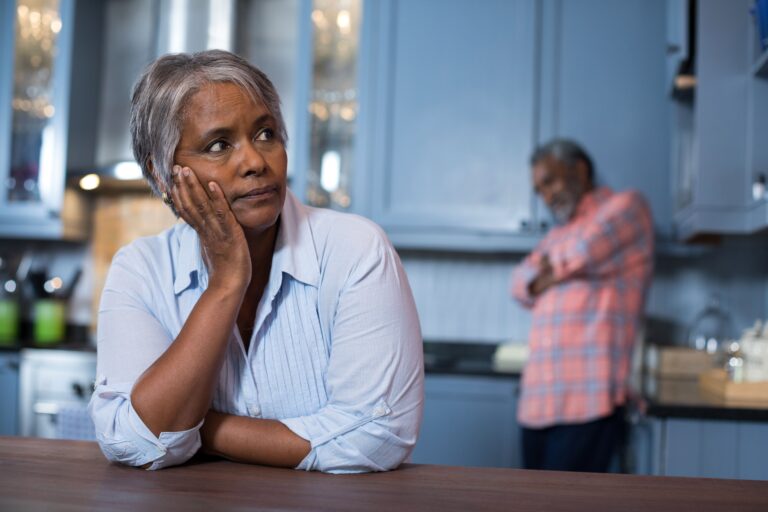Last week we looked at the direct financial burden of endometriosis, including the loss of education, loss of productivity at work and home, and loss of income. Today we look at the personal burden of endometriosis- the altered relationships with family and friends, the pain and suffering, the ill effects on mental health, and the loss of who we feel we are as a person because of it.
Pain and fatigue can limit our ability to function and the quality of our life experience (Missmer et al., 2021). Our ability to maintain relationships can be difficult, especially when others do not understand the impact that endometriosis has on us. Much research has shown the effect on intimate partner relationships due to the interference with sexual health (Missmer et al., 2021). Not as many studies have been done on the effects of parenting with endometriosis; however, in our Facebook group Nancy’s Nook, many of you have shared the significant effect endometriosis has had on the ability to function as a parent. These limitations imposed from our illness can affect our mental health as well.
In studies, people with endometriosis express “feelings of worthlessness, guilt, and frustration connected with disease-related limitations on participation in daily activities, social functioning, independence, and interpersonal relationships” as well as frustration “from a woman’s inability to manage or predict her pain and the feeling that endometriosis/endometriosis-associated pain controls her life” (Missmer et al., 2021). Add to this the burden of the “perception that others (even healthcare professionals) consider what they are experiencing to be ‘all in their heads’” (Missmer et al., 2021). The struggle is real. And it is no wonder that many feel a loss of who they are as a person because of it.
On a positive note, a systematic review and meta-analysis, as well as other studies, reveal that surgery for endometriosis does improve quality of life (Arcoverde et al., 2019; Parra et al., 2021). Another study reports that “laparoscopic surgery is associated with improved quality of life and emotional well-being compared to medical therapies” and cautions that “although the GnRH agonists are effective in reducing endometriosis symptoms, they are often associated with anxiety and depression during treatment” (Laganà et al., 2017). To help manage symptoms, one study that surveyed people with endometriosis found that “heat (70%), rest (68%), and meditation or breathing exercises (47%)” helped and to a lesser degree “yoga/Pilates, stretching, and exercise” (Armour et al., 2019). Changes in diet, individualized to your specific needs, can help with symptom management for some (Karlsson, Patel, & Premberg, 2020). Other things such as acupuncture have been helpful to some as well. Mental healthcare is important to our well-being and should not be neglected either.
The impact endometriosis has on our lives is significant. Know that you are not alone.

References
Arcoverde, F. V. L., de Paula Andres, M., Borrelli, G. M., de Almeida Barbosa, P., Abrão, M. S., & Kho, R. M. (2019). Surgery for endometriosis improves major domains of quality of life: a systematic review and meta-analysis. Journal of minimally invasive gynecology, 26(2), 266-278. Retrieved from https://doi.org/10.1016/j.jmig.2018.09.774
Armour, M., Sinclair, J., Chalmers, K. J., & Smith, C. A. (2019). Self-management strategies amongst Australian women with endometriosis: a national online survey. BMC complementary and alternative medicine, 19(1), 1-8. Retrieved from https://link.springer.com/article/10.1186/s12906-019-2431-x
Karlsson, J. V., Patel, H., & Premberg, A. (2020). Experiences of health after dietary changes in endometriosis: a qualitative interview study. BMJ open, 10(2), e032321. Retrieved from https://bmjopen.bmj.com/content/10/2/e032321.abstract
Laganà, A. S., La Rosa, V. L., Rapisarda, A. M. C., Valenti, G., Sapia, F., Chiofalo, B., … & Vitale, S. G. (2017). Anxiety and depression in patients with endometriosis: impact and management challenges. International journal of women’s health, 9, 323. Retrieved from https://www.ncbi.nlm.nih.gov/pmc/articles/PMC5440042/
Missmer, S. A., Tu, F. F., Agarwal, S. K., Chapron, C., Soliman, A. M., Chiuve, S., … & As-Sanie, S. (2021). Impact of Endometriosis on Life-Course Potential: A Narrative Review. International Journal of General Medicine, 14, 9. doi: 10.2147/IJGM.S261139
Parra, R. S., Feitosa, M. R., Camargo, H. P. D., Valério, F. P., Zanardi, J. V. C., Rocha, J. J. R. D., & Féres, O. (2021). The impact of laparoscopic surgery on the symptoms and wellbeing of patients with deep infiltrating endometriosis and bowel involvement. Journal of Psychosomatic Obstetrics & Gynecology, 42(1), 75-80. Retrieved from https://doi.org/10.1080/0167482X.2020.1773785

